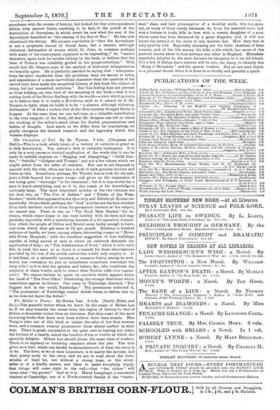For Richer or Poorer. By Holme Lee. 3 vole. (Smith,
Elder, and Co.)—The graceful writer whom we know by the name of Helms Lee is, if we may transfer the terms from the region of history to that of fiction, a chronicler rather than an historian. But then some of the most charming books that have ever been written have been annals. Miss Yonge's tales are of this kind, or rather the tales of her first manner were, and a common consent pronounces them almost perfect in their way. There is great enjoyment of the quiet sort in hearing her relate the fortune of a family, one of the families of ten or twelve in which she specially delights. Holme Lee should please the same class of readers. There is no mystery or torturing suspense about the plot. The title gives us a hint, which can hardly be misunderstood, of what the story is to be. The hero, so we at once conjecture, is to marry the heroine, and that pretty early in the story, and we are to read about the vicis- situdes of their lot, not without a strong hope, as the story- teller is of a kindly nature, and likes to make everybody happy, that things will come right in the end,—that "the richer" will come after "the poorer." And so it is. Harry Lamplugh, a successful student at Cambridge, son of a North-country family of the "states-
man" class, and heir presumptive of a wealthy uncle, who has gone out, as many of those sturdy dalesmen do, from his paternal acres and won a fortune in trade, falls in love with a cousin, daughter of a an whose name has been darkened by a great disgrace, and, it will not injure the interest of the story to say, marries her. How they fare is very prettily told. Especially charming are the little sketches of lake scenery, and of the life among the hills, a life which has more of the pastoral charm about it than perhaps any other in England. Holwdale especially delights us, the more because we recognize in it an old friend. Not a few of Holme Lee's readers will be able, we fancy, to identify the "King of Holmdale " and his parson brother. But no one need object. to a personal sketch when it is done in so kindly and graceful a spirit.






























 Previous page
Previous page